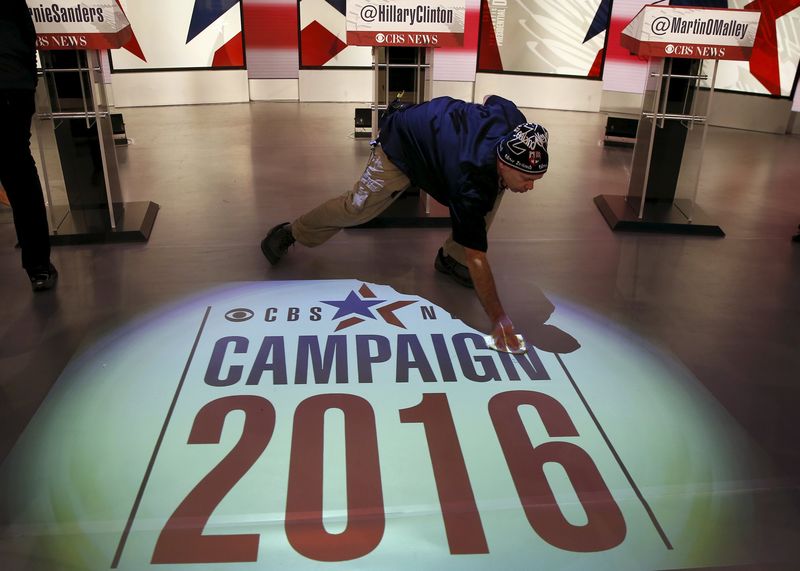By James Oliphant and John Whitesides
WASHINGTON/DES MOINES, Iowa (Reuters) - The lethal attacks in Paris have the potential to reshape the U.S. presidential race, placing a new emphasis on issues of national security, border control, and counterterrorism, while perhaps bolstering candidates who talk toughest about taking on Islamic State militants both at home and abroad.
National security has not assumed a central place in a U.S. presidential election for more than a decade as the economy preoccupied American voters. But with the nation's economic health on the upswing and the threat of Islamic terrorism now looming in Europe, that may change.
National security will be the focus of Saturday's Democratic presidential debate in Iowa, with the front-runner, Hillary Clinton, expected to be pressed on how she would confront the threat from Islamic State and other terror groups.
"Something as startling, as shocking as these attacks are going to propel (national security) back to center stage," said Brian Katulis, a foreign-policy analyst with the Center for American Progress, a think-tank in Washington.
In the immediate aftermath of the coordinated assaults in Paris, which killed at least 129 and injured 352 more and for which Islamic State has claimed responsibility, conservative presidential candidates Donald Trump and Ted Cruz called on the Obama administration to reconsider plans to allow thousands of Syrian refugees to be resettled in the United States.
"With the problems our country has, to take in 250,000 people, some of whom are going to have problems, big problems, is just insane," Trump said at a rally Saturday in Beaumont, Texas.
In an interview with Fox News, Cruz, a senator from Texas, called taking in refugees "lunacy."
The White House aims to increase to 10,000 the number of Syrian refugees accepted in the United States during fiscal year 2016, from the less than 2,000 accepted in the previous year.
Another Republican contender, Carly Fiorina, criticized the Obama administration for not building a stronger coalition in the Middle East in the fight against Islamic State.
"Jordan, Kuwait, Turkey, Saudi Arabia, Egypt, the Bahrainis, the Emiratis, the Kurds, all our fighting ISIS on the ground as we speak," Fiorina said in a campaign appearance in Florida on Saturday. "And all, every single one of them have asked the United States of America for support, for weapons, for material, for intelligence sharing. Mostly this administration has said no. I will say yes."
Peter Feaver, a former top aide to the National Security Council during the George W. Bush administration, said the attacks may swing Republican primary voters toward more practiced candidates such as former Florida Governor Jeb Bush. "I think the adult candidates have an opportunity," Feaver said. "This is why we elect serious leaders."
Added Republican strategist Ron Bonjean: "The race will become much more serious to voters who are reminded about the seriousness of picking a leader."
So far, most Republicans candidates have stopped short of detailing a policy response to Islamic State the Paris attacks. Bush called it "the war of our time, while Marco Rubio, the U.S. senator from Florida, said it was "a clash of civilizations."
CLINTON'S FOREIGN POLICY EDGE
While Republicans on the campaign trail have consistently hammered President Barack Obama for the prosecution of the U.S. response against Islamic State in Iraq and Syria, they, for the most part, have resisted calling for a more aggressive troop presence in the region.
Cruz, Trump, and Ben Carson, another leading candidate, have been the party's most vocal in terms of sealing the border to contain the threat of domestic terrorism. Carson has said that no Muslim should be eligible to be elected president.
"Carson has the most to lose as this happens," Bonjean said, "because he lacks a working foreign policy knowledge and is not comfortable talking in detail national security issues."
The last presidential election to turn on national security is widely viewed to have been in 2004, three years after the Sept. 11, 2001 attacks on New York and Washington, when President George W. Bush was re-elected over Democratic challenger John Kerry.
The Democratic debate Saturday, to be broadcast by CBS, will afford Clinton the opportunity to display her command of foreign policy, an area where the former secretary of state has a significant edge on rivals Bernie Sanders, a senator from Vermont, and former Maryland Governor Martin O'Malley.
With an eye on a potential November 2016 general election match-up against Republicans, Clinton will try to take a tough line on battling terrorism without appearing defensive about her years of leading Obama's foreign policy team.
She is likely to be asked by the debate moderators about Obama's remarks in an interview aired Friday that Islamic State has been "contained." Those words were widely criticized on social media Friday as the events in Paris played out.
A foreign policy focus in the debate would constitute a shift of emphasis in a Democratic presidential race that so far has been dominated by domestic economic issues such as income inequality, college affordability and family leave.

The debate at Drake University in Des Moines, Iowa, the state that holds the first nominating contest on Feb. 1, will begin at 9 p.m. EST.